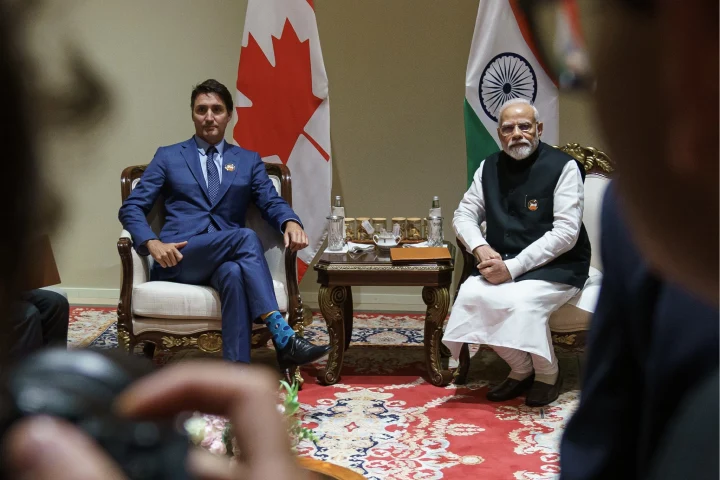

India has asked Canada to recall over 40 of its diplomats from India.
Amidst ongoing tensions with the Trudeau government over its inaction against Khalistan supporters, India and Canada have “paused” trade talks due to certain political developments. A spokesperson for Canadian Trade Minister Mary Ng confirmed the change, though no reason was offered for the delay.
This comes just days after Prime Minister Narendra Modi expressed concern over ‘anti-India activities of extremist elements’ in Canada at his meeting with Canadian counterpart Justin Trudeau on the sidelines of the G20 Summit last week.
Confirming this, a senior Indian government official said that India-Canada talks on a Comprehensive Economic Partnership Agreement (CEPA) are expected to resume only after the resolution of the issues between the two countries. “There were certain political developments in Canada on which India has also raised its objection for the time being [till] these political developments are settled, we have paused the negotiations with Canada. But the moment these political issues are sorted out, the talks will resume. There is no break, there is only pause,” said the official.
India and Canada were discussing an early harvest scheme or a preliminary free trade agreement to push bilateral trade with New Delhi interested in securing an easier visa regime for students and professionals.
In March 2022, the two countries had agreed to re-launch the CEPA negotiations and consider an interim agreement or Early Progress Trade Agreement (EPTA) that could bring commercial gains to both. Negotiations on CEPA/ EPTA resumed in April 2022; nine rounds of talks were held till July this year. The last round, from July 12-21, was held in virtual format. So far, the two countries have held discussions on tracks related to goods, trade remedies, rules of origin, origin procedures, services, institutional and core provisions .In 2022, India was Canada’s 10th largest trading partner; since 2018, India has also been the largest source of international students in Canada.
Ties between the two countries have been strained over the last few months after the activities of pro-Khalistan groups in Canada. In July, India had summoned the Canadian envoy and issued a demarche, days after posters naming senior Indian diplomats posted in Canada came up in some areas there.
On September 10, following a meeting between Modi and Trudeau on the sidelines of the G20 Summit, India issued a strongly-worded statement.
“He (Modi) conveyed our strong concerns about continuing anti-India activities of extremist elements in Canada. They are promoting secessionism and inciting violence against Indian diplomats, damaging diplomatic premises, and threatening the Indian community in Canada and their places of worship,” the Ministry of External Affairs (MEA) said in a readout of the meeting.
“The nexus of such forces with organised crime, drug syndicates and human trafficking should be a concern for Canada as well. It is essential for the two countries to cooperate in dealing with such threats. The Prime Minister highlighted that India-Canada relations are anchored in shared democratic values, respect for rule of law and strong people-to-people ties,” it added.
Addressing India’s concerns Trudeau had said in a press conference, “Canada will always defend freedom of expression, freedom of conscience, and freedom of peaceful protest, and it is extremely important to us. At the same time, we are always there to prevent violence and to push back against hatred. I think, on the issue of the community, it is important to remember that the actions of a few do not represent the entire community or Canada”.
Canadian PM Justin Trudeau’s stance resulted in the Modi government giving him a cold shoulder during the G20 Summit in Delhi, where he was stranded as his 30-year-old plane developed problems and the replacement aircraft too developed a snag.
It may be noted that while he was stuck here, banned organisation Sikhs for Justice managed to hold a so-called” referendum “event in Canadian Gurdwara with terrorist Gurpatwant Singh Pannun making a public appearance and delivering an instigating speech hinting at ‘balkanizing’ India which eventually brought country’s intentions to curtail Khalistani terror under scanner.
Flipkart, India's leading e-commerce platform has decided to relocate its holding company from Singapore to…
Union Minister of Heavy Industries and Steel H D Kumaraswamy welcomed the decision of the…
As Prime Minister Narendra Modi embarks on a crucial two day visit to Saudi Arabia…
By Ishaan Prakash Almost everywhere one looks, China is ramping up pressure against neighbours and…
Federal Bureau of Investigation Director Kash Patel on Monday (local time) assured that justice will…
India-Saudi Arabia High Level Task Force on Investments held its meeting in Riyadh on Monday,…